https://www.dailymaverick.co.za/art...for-singapore-in-bizarre-colonial-era-scheme/
British soldiers are training and recruiting Gurkhas in Nepal who are then sent to work as police officers in Singapore, a country which has draconian laws restricting protests and a press freedom rating lower than Myanmar, Russia and Zimbabwe.
The Gurkhas in Singapore are commanded by retired British army officers and UK officials have privately described the arrangement as “colonial” and “bizarre”. In one of the most disturbing incidents in the past, Declassified UK has found the Gurkhas were complicit in the “waterboarding” of a Singaporean trade union leader.
However, Britain likely maintains the scheme partly to promote its naval interests in Singapore, where Human Rights Watch says the ruling party has an “authoritarian grip” on power, using the death penalty and corporal punishment against non-violent offenders.
A key component of the country’s security apparatus is the Gurkha Contingent of Singapore’s police force (known by the acronym GCSPF), which has around 2,000 specially trained constables.
Although the unit is officially separate from the British army, last year Singapore paid the UK Ministry of Defence (MOD) £372,856 to train and recruit Gurkhas, our investigation has found.
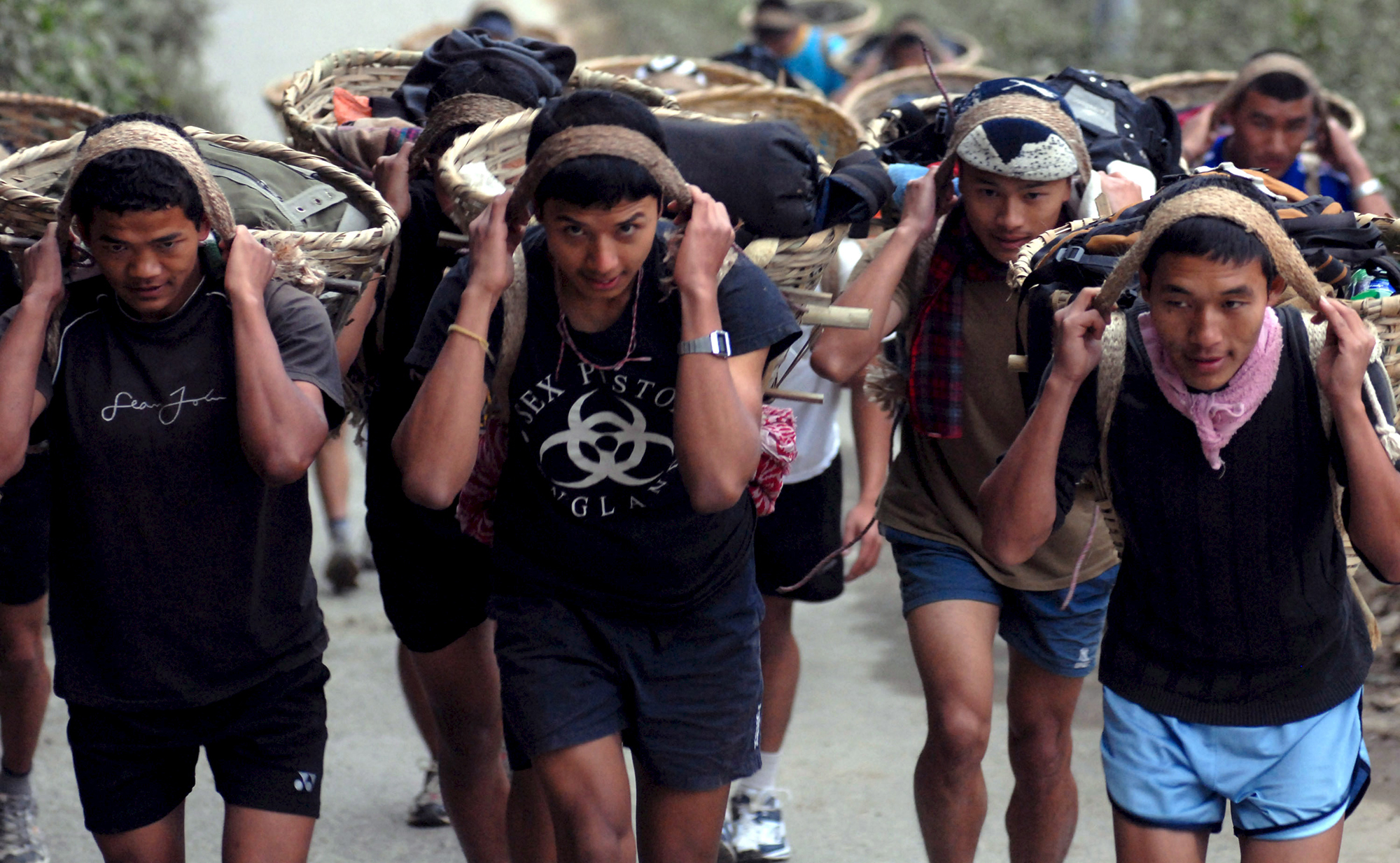

Nepalese youths carry 35kg baskets of sand during training in 2008 to join the British army or Singapore Police (Photo: EPA / Narendra Shrestha)
The MOD told Declassified UK that the amount of money it receives from the deal has more than doubled since 2017 – totalling £821,439 over the last three years.
This increase was due to a rise in the number of Gurkhas recruited for Singapore, coupled with inflation. An MOD official explained: “Singapore police pay a proportion of the costs of recruiting based on the numbers that they take and any costs incurred that are wholly attributable to GCSPF.”
After the Gurkhas retire and return to Nepal, Singapore pays their pensions via the British army.
The payments take place under a long-standing but seldom mentioned arrangement that dates back to colonial times and has not been scrutinised by Britain’s parliament for more than four decades.
The recruitment scheme was quietly renegotiated in September 2003, when the British army completed what one lieutenant-colonel described as a “long and drawn out [process], covering many years” to update its agreement with Singapore.
Three new “Agreed Operating Procedures” were drawn up governing the provision of pensions, recruitment and training support.
Declassified UK has obtained a copy of the documents, which show Singapore is allowed to use British military facilities in Nepal to pay ex-Gurkhas their pensions.
Singapore’s police maintain a £100,000 float with the British army in Nepal “to be used as the advance payment of pension or gratuity” to GCSPF pensioners. Britain’s MOD then sends “bills” to Singapore’s police which ensures the correct amounts are paid to its veterans.
Serving under British officers
This year the British army will conduct gruelling fitness tests alongside basic literacy and numeracy exams in Nepal to find 120 Gurkhas who are suitable for Singapore’s police, before Singapore makes the final decision about who is allowed to join.
It means that more than 20% of the British army’s recruitment work in Nepal is designed to enlist Gurkhas for Singapore’s police rather than for UK forces.
While in Nepal, the British army provides the recruits with clothing, induction training and a welcome meal for their families. The UK also supplies “land transport, camping equipment and a pool of porters” during treks.
A senior officer from the GCSPF supervises the initial recruitment process in Nepal, where the British army provides Singapore’s police with an administrative office, according to the 2003 agreement obtained by Declassified UK.
Upon arrival in Singapore the recruits serve under a former British army Gurkha officer, Major Mark Lindsay Ross Forman, who holds the rank of assistant commissioner in Singapore’s police. His deputy commander, Will Kefford, is also an ex-British army officer.
When Forman left the British army, he continued to be listed as a reservist. However, the Ministry of Defence refused to tell Declassified UK whether he had ever worked for Singapore’s police while in his reservist role.
An army spokesperson said: “We are not prepared to release any personal information about any individuals referenced. We have a common law and Data Protection Act duty to protect the personal information of our employees or ex-employees.”
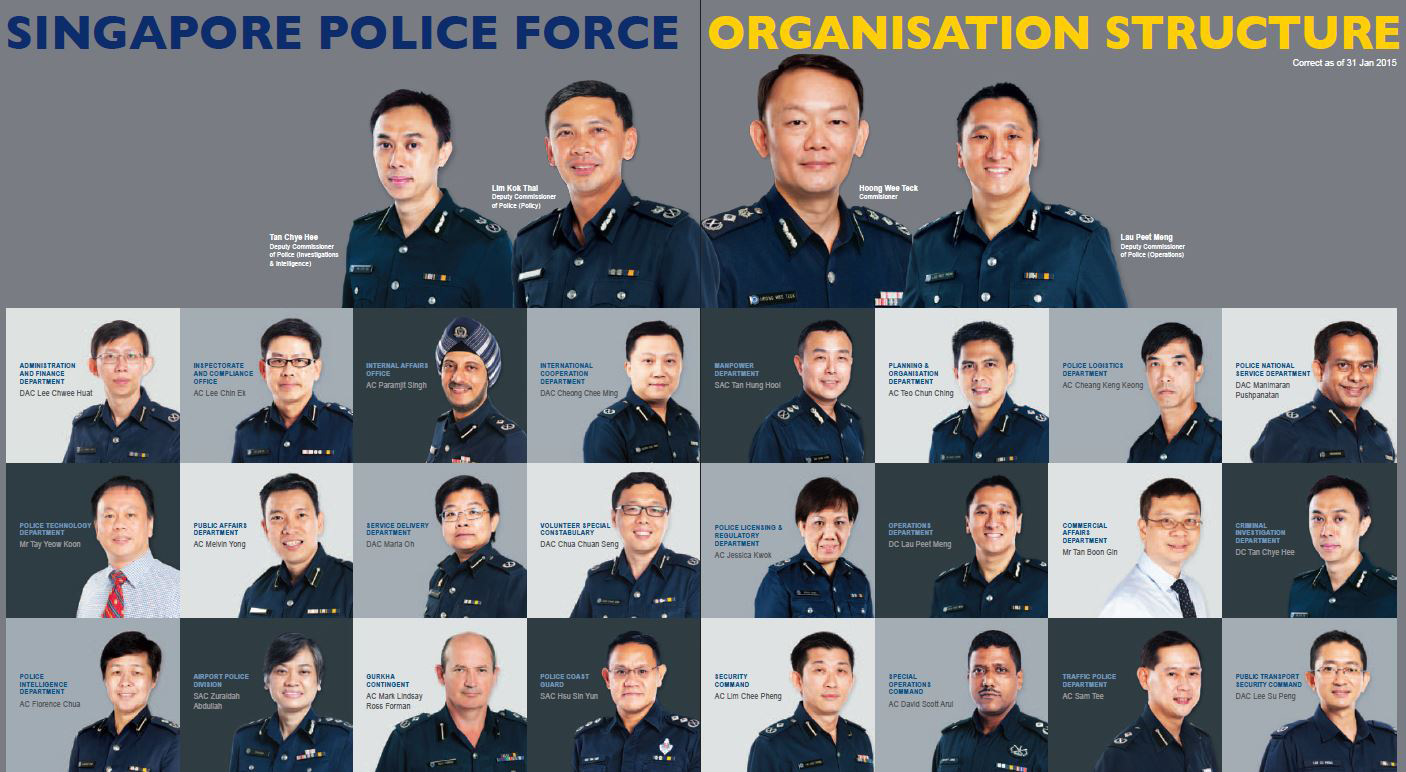

Gurkha Contingent commander Mark Lindsay Ross Forman pictured in the Singapore Police Force’s hierarchy in 2015 (Photo: Singapore Police Force magazine)
Paramilitary policemen
The Gurkha Contingent in Singapore functions as an armed paramilitary police unit, based off Joo Seng street at Mount Vernon barracks, a self-contained cantonment named after an English admiral.
Local people told Declassified UK the men are seldom seen in public but they are known to protect the country’s key infrastructure, providing security during peace talks held between Donald Trump and Kim Jong-un in 2018.
An intoxicated driver was shot dead by the unit in 2015 when he drove through security barriers at the Shangri-La Hotel. A coroner ruled the killing lawful.
Declassified files show that some UK diplomats and military officers wanted the supply scheme stopped decades ago.
However, Britain’s recruitment of police for Singapore has secured favour with the country’s ruling party, which allows the UK to keep a naval logistics base at Sembawang Wharf, known as British Defence Singapore Support Unit (BDSSU) or Naval Party 1022 – although an MOD spokesperson claimed the Gurkha deal “is not related to or has any impact on access to any naval depot in Singapore”.
Eight British military staff are permanently based at the wharf which cost the UK £1.2-million to maintain last year. In 2016, Britain’s then-defence secretary Michael Fallon announced that Singapore would be a “hub for defence engagement” in the Asia-Pacific region, and a Gurkha colonel, Jamie Murray, has been appointed to oversee the initiative.
Fallon also noted Singapore’s proximity to China and highlighted how trade worth “£3-trillion a year [is] passing through the South China Sea”. The British army told Declassified: “Singapore is a strategically important location for commerce and trade. In the interconnected world the Straits of Malacca continue to be an important trade route and a strategic strait.”
Singapore and Britain are both part of the Five Powers Defence Arrangements, an informal regional security pact along with Malaysia, Australia and New Zealand.
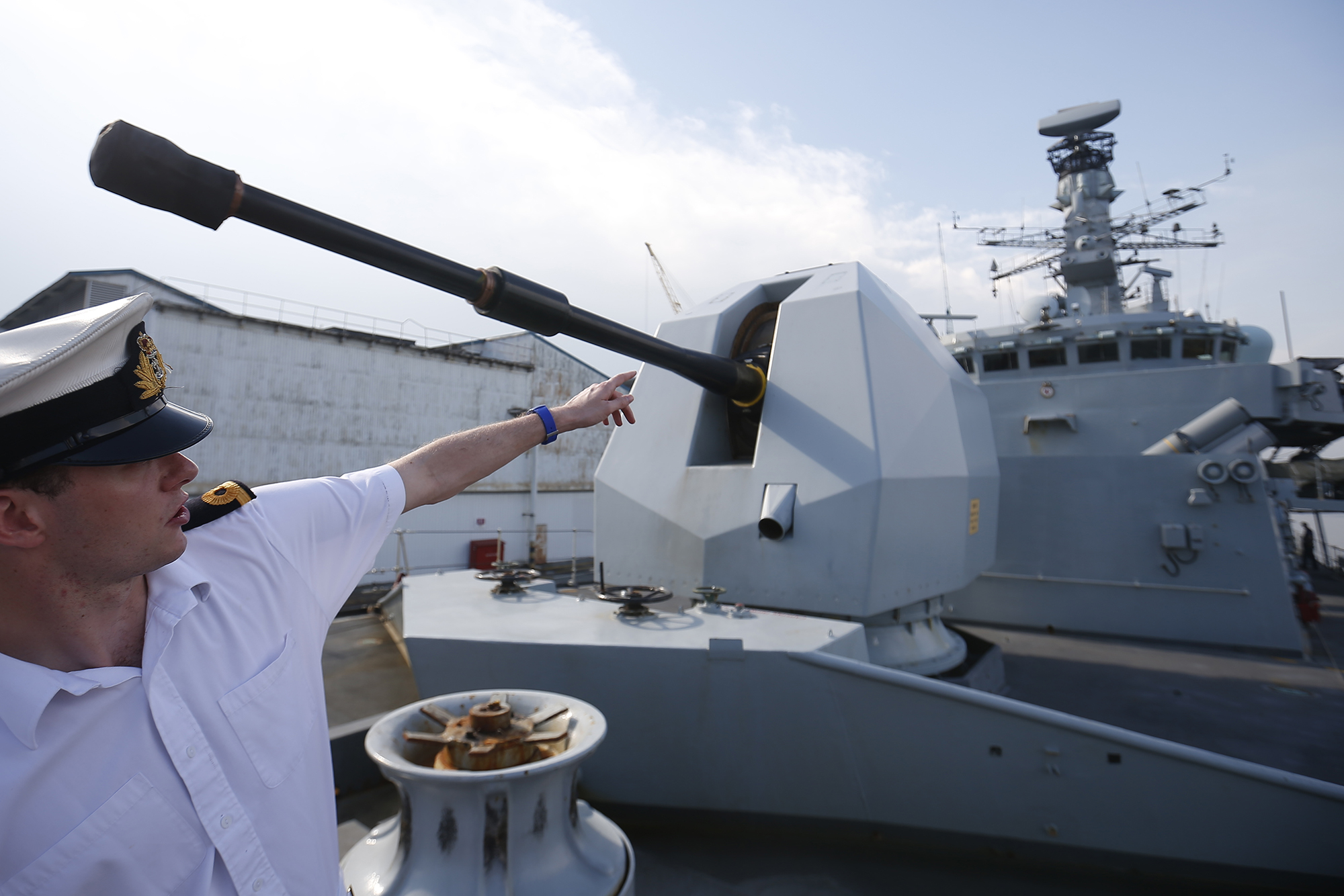

A Royal Navy officer points towards the main gun of the frigate HMS Sutherland moored at Sembawang Wharf in 2018 (Photo: EPA-EFE / Wallace Woon)
Relic of empire
The Gurkha Contingent was formed in 1949 when Singapore was still under British rule. Hailing from Nepal, its members were seen as impartial outsiders who would not take sides in disputes between Singapore’s Chinese and Malay communities.
The contingent began as an urban riot squad and was used on jungle operations and coastal patrols before Singapore became independent in 1965. Little attention was paid to the unit until 1979 when 70 Gurkhas staged a “mutiny” against their commander, a serving British army officer, over allegations of favouritism. Declassified files show that the incident prompted a review by the UK MOD to consider the future of the unit.
It quickly became apparent that British diplomats in Singapore had little understanding of the scheme and struggled to “get down on paper what we knew or could find out about it”. A perplexed UK army major asked, “Who pays whom for what?”
One diplomat in the British High Commission in Singapore, Hugh Davies, commented that the scheme was “somewhat bizarre”.
“What makes the Gurkhas’ presence in Singapore remarkable is precisely that it is so little remarked upon,” he added. “It may seem surprising that, with an efficient corruption-free police force of its own, Singapore continues to feel the need to employ foreign mercenaries.”
The description of Gurkhas as “mercenaries” was echoed by several of Davies’ colleagues. The UK chargé d’affaires in Nepal’s capital, Kathmandu, commented in 1979: “The fact that Nepalese are serving as mercenaries in foreign armies rankles considerably.”
He added: “For this reason, we traditionally keep a very low profile in Nepal in regard to Gurkha recruitment: everyone knows that it is going on, but the less said about it publicly the better.”
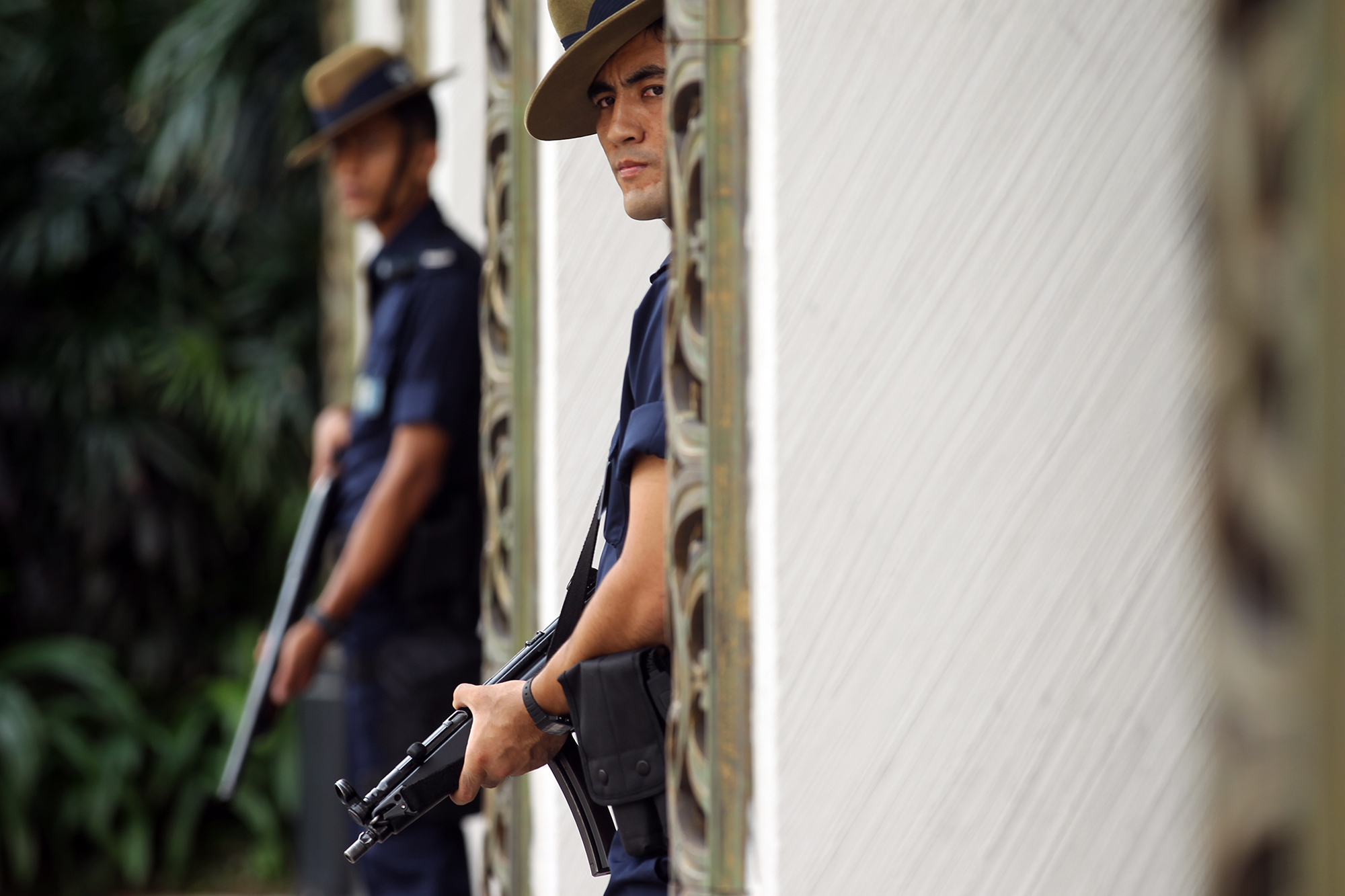

Gurkhas guard the Shangri-La Dialogue in Singapore, 2011 (Photo: EPA / Stephen Morrison)
Water torture on Britain’s watch
Some British officials expressed alarm about “the risk we already run over a force which we recruit but do not control” and confusion over the Gurkhas’ “legal status” as policemen in Singapore.
Declassified files from 1979-80 highlight particular concern over 200 Gurkhas working as guards in Singapore’s Whitley Road and Moon Crescent detention centres where a diplomat said “hard-core political detainees” were being held without trial for years on end.
At that time, the Singaporean government had imprisoned numerous left-wing opponents at these sites, including Ho Piao – the general secretary of the Singapore National Seamen’s Union – who had been held since 1963 under Operation Cold Stone, a political crackdown in the country.
Piao’s treatment worsened in 1979 when he was allegedly tortured at an underground cubicle in Whiteley Road prison where Gurkhas worked as guards. During a four-day interrogation, Piao was forcibly doused with cold water hundreds of times, repeatedly beaten and blasted with cold air, according to an Amnesty International report.
“I was tied to a wooden chair,” Piao told his lawyer. “They pulled my hair, pressed my nose and poured water through my nose and mouth. They pressed my throat and hit my lower abdomen three times until I suffered spasmodic pain.”
“They then tightened their grip on my hands, and pressed their fists against my abdomen until I could hardly breathe… Their torture made my body feel like a corpse.”
Although Piao’s ordeal was conducted by Singaporeans, the UK could not completely distance itself from such an incident. One British official noted: “It is ironic that while detention without trial and deprivation of human rights have been irritants in Anglo-Singapore relations in recent years, such detainees have been guarded by a British-recruited force which… is commanded by a serving British officer.”
Gurkhas no longer guard Singapore’s prisons as that role has since been outsourced to private security companies.
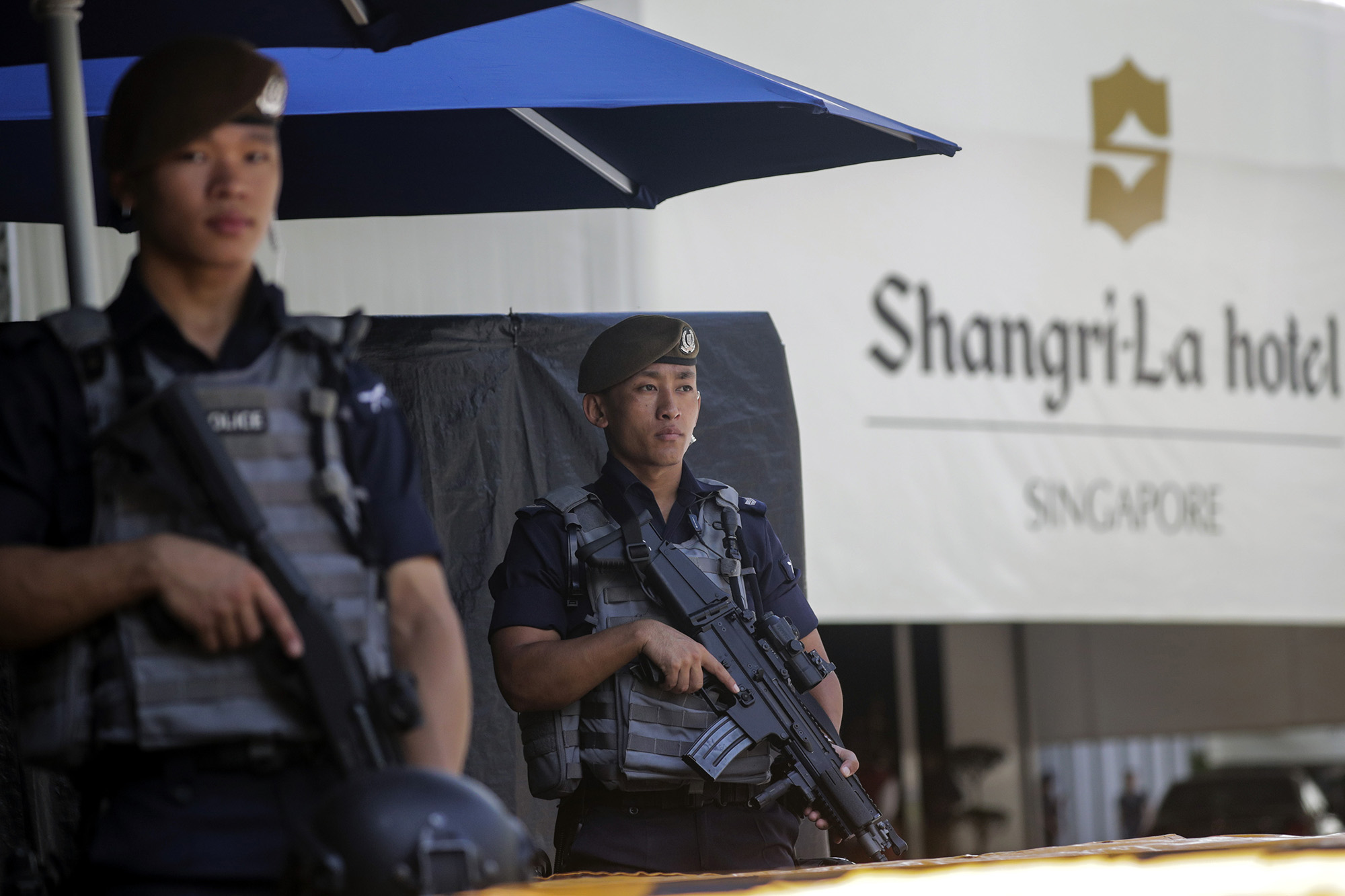

Gurkhas guard an International Institute for Strategic Studies security summit at the Shangri-La Hotel in Singapore, 2019 (Photo: EPA-EFE / Wallace Woon)
By April 1980, the British ambassador in Kathmandu, John Denson, was warning that: “Our aim should be eventually to disengage to the greatest possible degree from the Singapore Gurkhas.”
His view was fully supported by Major-General John Chapple who led the British army’s Brigade of Gurkhas. He regarded the Gurkha unit in Singapore as “potentially dangerous” and insisted: “Our long-term aim should as far as possible be to have as little as possible to do with it.”
The Gurkhas’ presence was resented by some local people because the “very act of their being here implies there are certain tasks which Singaporeans just cannot be trusted to do, and this rankles,” one British file recorded.
The British commander of the Gurkha Contingent in Singapore, Major Moore, said in 1979 he was “resented by younger Singaporean police officers as a symbol of the colonial legacy they thought they had been shot of long ago”. A British diplomat added: “Their role as guards over political detainees also suggests that local police could not be trusted to be subverted by contact with such men.”
Praetorian Guard
However, the unit was particularly popular with Lee Kuan Yew, who had been Singapore’s prime minister and leading political force since the early 1960s. He used the Gurkhas to guard his office and residence, making them appear to be a “Praetorian Guard”, according to Hugh Davies.
Davies was also acutely aware that Britain wanted to keep a naval oil depot in Singapore in 1979. He wrote: “At a time when we are anxious… to demonstrate renewed political interest in South East Asia, it would probably be a mistake to propose any drastic change in assistance we provide Singapore over the Gurkhas.”
A consensus was reached among British officials that they would have to provide extra training to the Gurkha contingent to raise its standards before the UK could step back from commanding the unit.
Major Moore was replaced by a new British commander, Lieutenant-Colonel Bruce Niven, who remained on loan from the British army to Singapore’s police until 1984. Thereafter Niven was directly contracted by Singapore until at least 2002.
A freedom of information request by Declassified has found that Niven was visited in 1986 by someone – their identity is censored – who wanted a British mercenary firm, Keenie Meenie Services, to recruit a company of Gurkhas for service in Sri Lanka, which was being rocked by civil war.
However Sri Lanka’s President JR Jayewardene was reportedly “not keen on the idea” and his defence secretary General Sapala Attygalle questioned the Gurkhas’ discipline record, commenting that “we don’t want highly paid mutineers”. DM
Phil Miller is a staff reporter for Declassified UK, an investigative journalism organisation focusing on Britain’s foreign, military and intelligence policies. Miller’s book about British mercenaries, Keenie Meenie, is available from Pluto Press. Follow @DeclassifiedUK and @pmillerinfo for updates
British soldiers are training and recruiting Gurkhas in Nepal who are then sent to work as police officers in Singapore, a country which has draconian laws restricting protests and a press freedom rating lower than Myanmar, Russia and Zimbabwe.
The Gurkhas in Singapore are commanded by retired British army officers and UK officials have privately described the arrangement as “colonial” and “bizarre”. In one of the most disturbing incidents in the past, Declassified UK has found the Gurkhas were complicit in the “waterboarding” of a Singaporean trade union leader.
However, Britain likely maintains the scheme partly to promote its naval interests in Singapore, where Human Rights Watch says the ruling party has an “authoritarian grip” on power, using the death penalty and corporal punishment against non-violent offenders.
A key component of the country’s security apparatus is the Gurkha Contingent of Singapore’s police force (known by the acronym GCSPF), which has around 2,000 specially trained constables.
Although the unit is officially separate from the British army, last year Singapore paid the UK Ministry of Defence (MOD) £372,856 to train and recruit Gurkhas, our investigation has found.

Nepalese youths carry 35kg baskets of sand during training in 2008 to join the British army or Singapore Police (Photo: EPA / Narendra Shrestha)
The MOD told Declassified UK that the amount of money it receives from the deal has more than doubled since 2017 – totalling £821,439 over the last three years.
This increase was due to a rise in the number of Gurkhas recruited for Singapore, coupled with inflation. An MOD official explained: “Singapore police pay a proportion of the costs of recruiting based on the numbers that they take and any costs incurred that are wholly attributable to GCSPF.”
After the Gurkhas retire and return to Nepal, Singapore pays their pensions via the British army.
The payments take place under a long-standing but seldom mentioned arrangement that dates back to colonial times and has not been scrutinised by Britain’s parliament for more than four decades.
The recruitment scheme was quietly renegotiated in September 2003, when the British army completed what one lieutenant-colonel described as a “long and drawn out [process], covering many years” to update its agreement with Singapore.
Three new “Agreed Operating Procedures” were drawn up governing the provision of pensions, recruitment and training support.
Declassified UK has obtained a copy of the documents, which show Singapore is allowed to use British military facilities in Nepal to pay ex-Gurkhas their pensions.
Singapore’s police maintain a £100,000 float with the British army in Nepal “to be used as the advance payment of pension or gratuity” to GCSPF pensioners. Britain’s MOD then sends “bills” to Singapore’s police which ensures the correct amounts are paid to its veterans.
Serving under British officers
This year the British army will conduct gruelling fitness tests alongside basic literacy and numeracy exams in Nepal to find 120 Gurkhas who are suitable for Singapore’s police, before Singapore makes the final decision about who is allowed to join.
It means that more than 20% of the British army’s recruitment work in Nepal is designed to enlist Gurkhas for Singapore’s police rather than for UK forces.
While in Nepal, the British army provides the recruits with clothing, induction training and a welcome meal for their families. The UK also supplies “land transport, camping equipment and a pool of porters” during treks.
A senior officer from the GCSPF supervises the initial recruitment process in Nepal, where the British army provides Singapore’s police with an administrative office, according to the 2003 agreement obtained by Declassified UK.
Upon arrival in Singapore the recruits serve under a former British army Gurkha officer, Major Mark Lindsay Ross Forman, who holds the rank of assistant commissioner in Singapore’s police. His deputy commander, Will Kefford, is also an ex-British army officer.
When Forman left the British army, he continued to be listed as a reservist. However, the Ministry of Defence refused to tell Declassified UK whether he had ever worked for Singapore’s police while in his reservist role.
An army spokesperson said: “We are not prepared to release any personal information about any individuals referenced. We have a common law and Data Protection Act duty to protect the personal information of our employees or ex-employees.”

Gurkha Contingent commander Mark Lindsay Ross Forman pictured in the Singapore Police Force’s hierarchy in 2015 (Photo: Singapore Police Force magazine)
Paramilitary policemen
The Gurkha Contingent in Singapore functions as an armed paramilitary police unit, based off Joo Seng street at Mount Vernon barracks, a self-contained cantonment named after an English admiral.
Local people told Declassified UK the men are seldom seen in public but they are known to protect the country’s key infrastructure, providing security during peace talks held between Donald Trump and Kim Jong-un in 2018.
An intoxicated driver was shot dead by the unit in 2015 when he drove through security barriers at the Shangri-La Hotel. A coroner ruled the killing lawful.
Declassified files show that some UK diplomats and military officers wanted the supply scheme stopped decades ago.
However, Britain’s recruitment of police for Singapore has secured favour with the country’s ruling party, which allows the UK to keep a naval logistics base at Sembawang Wharf, known as British Defence Singapore Support Unit (BDSSU) or Naval Party 1022 – although an MOD spokesperson claimed the Gurkha deal “is not related to or has any impact on access to any naval depot in Singapore”.
Eight British military staff are permanently based at the wharf which cost the UK £1.2-million to maintain last year. In 2016, Britain’s then-defence secretary Michael Fallon announced that Singapore would be a “hub for defence engagement” in the Asia-Pacific region, and a Gurkha colonel, Jamie Murray, has been appointed to oversee the initiative.
Fallon also noted Singapore’s proximity to China and highlighted how trade worth “£3-trillion a year [is] passing through the South China Sea”. The British army told Declassified: “Singapore is a strategically important location for commerce and trade. In the interconnected world the Straits of Malacca continue to be an important trade route and a strategic strait.”
Singapore and Britain are both part of the Five Powers Defence Arrangements, an informal regional security pact along with Malaysia, Australia and New Zealand.

A Royal Navy officer points towards the main gun of the frigate HMS Sutherland moored at Sembawang Wharf in 2018 (Photo: EPA-EFE / Wallace Woon)
Relic of empire
The Gurkha Contingent was formed in 1949 when Singapore was still under British rule. Hailing from Nepal, its members were seen as impartial outsiders who would not take sides in disputes between Singapore’s Chinese and Malay communities.
The contingent began as an urban riot squad and was used on jungle operations and coastal patrols before Singapore became independent in 1965. Little attention was paid to the unit until 1979 when 70 Gurkhas staged a “mutiny” against their commander, a serving British army officer, over allegations of favouritism. Declassified files show that the incident prompted a review by the UK MOD to consider the future of the unit.
It quickly became apparent that British diplomats in Singapore had little understanding of the scheme and struggled to “get down on paper what we knew or could find out about it”. A perplexed UK army major asked, “Who pays whom for what?”
One diplomat in the British High Commission in Singapore, Hugh Davies, commented that the scheme was “somewhat bizarre”.
“What makes the Gurkhas’ presence in Singapore remarkable is precisely that it is so little remarked upon,” he added. “It may seem surprising that, with an efficient corruption-free police force of its own, Singapore continues to feel the need to employ foreign mercenaries.”
The description of Gurkhas as “mercenaries” was echoed by several of Davies’ colleagues. The UK chargé d’affaires in Nepal’s capital, Kathmandu, commented in 1979: “The fact that Nepalese are serving as mercenaries in foreign armies rankles considerably.”
He added: “For this reason, we traditionally keep a very low profile in Nepal in regard to Gurkha recruitment: everyone knows that it is going on, but the less said about it publicly the better.”

Gurkhas guard the Shangri-La Dialogue in Singapore, 2011 (Photo: EPA / Stephen Morrison)
Water torture on Britain’s watch
Some British officials expressed alarm about “the risk we already run over a force which we recruit but do not control” and confusion over the Gurkhas’ “legal status” as policemen in Singapore.
Declassified files from 1979-80 highlight particular concern over 200 Gurkhas working as guards in Singapore’s Whitley Road and Moon Crescent detention centres where a diplomat said “hard-core political detainees” were being held without trial for years on end.
At that time, the Singaporean government had imprisoned numerous left-wing opponents at these sites, including Ho Piao – the general secretary of the Singapore National Seamen’s Union – who had been held since 1963 under Operation Cold Stone, a political crackdown in the country.
Piao’s treatment worsened in 1979 when he was allegedly tortured at an underground cubicle in Whiteley Road prison where Gurkhas worked as guards. During a four-day interrogation, Piao was forcibly doused with cold water hundreds of times, repeatedly beaten and blasted with cold air, according to an Amnesty International report.
“I was tied to a wooden chair,” Piao told his lawyer. “They pulled my hair, pressed my nose and poured water through my nose and mouth. They pressed my throat and hit my lower abdomen three times until I suffered spasmodic pain.”
“They then tightened their grip on my hands, and pressed their fists against my abdomen until I could hardly breathe… Their torture made my body feel like a corpse.”
Although Piao’s ordeal was conducted by Singaporeans, the UK could not completely distance itself from such an incident. One British official noted: “It is ironic that while detention without trial and deprivation of human rights have been irritants in Anglo-Singapore relations in recent years, such detainees have been guarded by a British-recruited force which… is commanded by a serving British officer.”
Gurkhas no longer guard Singapore’s prisons as that role has since been outsourced to private security companies.

Gurkhas guard an International Institute for Strategic Studies security summit at the Shangri-La Hotel in Singapore, 2019 (Photo: EPA-EFE / Wallace Woon)
By April 1980, the British ambassador in Kathmandu, John Denson, was warning that: “Our aim should be eventually to disengage to the greatest possible degree from the Singapore Gurkhas.”
His view was fully supported by Major-General John Chapple who led the British army’s Brigade of Gurkhas. He regarded the Gurkha unit in Singapore as “potentially dangerous” and insisted: “Our long-term aim should as far as possible be to have as little as possible to do with it.”
The Gurkhas’ presence was resented by some local people because the “very act of their being here implies there are certain tasks which Singaporeans just cannot be trusted to do, and this rankles,” one British file recorded.
The British commander of the Gurkha Contingent in Singapore, Major Moore, said in 1979 he was “resented by younger Singaporean police officers as a symbol of the colonial legacy they thought they had been shot of long ago”. A British diplomat added: “Their role as guards over political detainees also suggests that local police could not be trusted to be subverted by contact with such men.”
Praetorian Guard
However, the unit was particularly popular with Lee Kuan Yew, who had been Singapore’s prime minister and leading political force since the early 1960s. He used the Gurkhas to guard his office and residence, making them appear to be a “Praetorian Guard”, according to Hugh Davies.
Davies was also acutely aware that Britain wanted to keep a naval oil depot in Singapore in 1979. He wrote: “At a time when we are anxious… to demonstrate renewed political interest in South East Asia, it would probably be a mistake to propose any drastic change in assistance we provide Singapore over the Gurkhas.”
A consensus was reached among British officials that they would have to provide extra training to the Gurkha contingent to raise its standards before the UK could step back from commanding the unit.
Major Moore was replaced by a new British commander, Lieutenant-Colonel Bruce Niven, who remained on loan from the British army to Singapore’s police until 1984. Thereafter Niven was directly contracted by Singapore until at least 2002.
A freedom of information request by Declassified has found that Niven was visited in 1986 by someone – their identity is censored – who wanted a British mercenary firm, Keenie Meenie Services, to recruit a company of Gurkhas for service in Sri Lanka, which was being rocked by civil war.
However Sri Lanka’s President JR Jayewardene was reportedly “not keen on the idea” and his defence secretary General Sapala Attygalle questioned the Gurkhas’ discipline record, commenting that “we don’t want highly paid mutineers”. DM
Phil Miller is a staff reporter for Declassified UK, an investigative journalism organisation focusing on Britain’s foreign, military and intelligence policies. Miller’s book about British mercenaries, Keenie Meenie, is available from Pluto Press. Follow @DeclassifiedUK and @pmillerinfo for updates
